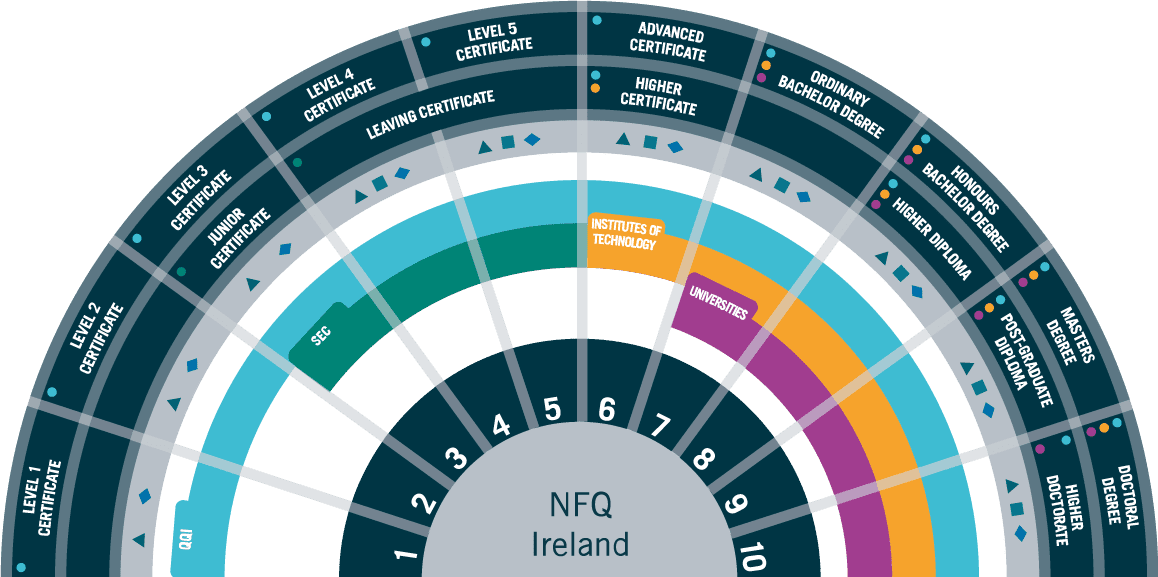- Overview
- Course outline
- Entry
- Career path
- How to apply
Course Overview
Designed to equip participants with the skills and competencies to take up roles as ‘Operators and Technicians of the future, this Level 6 Certificate in Information Technology for Process Digitalisation delivers the necessary blend of IT, technology and operational skills required to successfully implement digital transformation strategies.
Developed with extensive input from Ireland’s advanced manufacturing sector, this programme ensures students develop up-to-date know-how related to IT and automation, data management and analysis, computer architecture and programming applications.
Graduates of this programme will gain a range of critical skills required to actively support organisations as they develop and implement transformative digital improvements in manufacturing environments.
This programme provides participants with the IT skills necessary to successfully operate within an advanced manufacturing setting, including the following:
- Introduction to programme, writing code, datatypes and using code to problem solve. Understand data management and computer architecture through database commands and queries.
- Develop the fundamentals of information technology and automation, stack, data storage devices and cloud systems by working through simulations.
- Gain the ability to interpret and integrate code, troubleshoot and create programmes using user interfaces.
- Understand how to effectively use statistical applications and methods in industries that involve processes. Develop the ability to record, analyse and present data findings to a business.
Modules Include:
- Fundamentals of Maths and Statistics
- Transversal Skills
- Introduction to Programming
- Computer Architecture and Data Management
- Information Technology and Automation
- Programme Applications
- Industrial Statistics
- Data Analysis and Visualisation
Who is the programme for?
This programme is ideal for mature learners who are employed/seeking employment in a manufacturing environment or support service and wish to develop their knowledge, skills and competencies. This programme will produce graduates able to actively support the Industry 4.0 transition underway across Ireland’s advanced manufacturing/support services sector.
This course duration is 11 months. Lectures will be delivered 2 evenings per week online. Students will also be required to attend up to 2 Saturdays a month in class.
Accreditation: QQI Level 6 Minor Award in Information Technology for Process Digitisation
Next Intake: January 2026 – now taking applications.

Course Outline
The course duration is 11 months. Lectures will be delivered two evenings per week online and two Saturday’s per month, one of which will be delivered in-person. (ECTS: 60 Credits)
Module 1: Fundamentals of Maths and Statistics
Solve practical mathematical problems within a digitised industrial setting, providing a solid base of skills using mathematical tools that will be used in subsequent advanced modules e.g., Industrial Statistics and Programming modules within this programme.
Module 2: Transversal Skills
Skills to recognise the changing environmental climate and identify the skills and competencies to act in such an environment. Learners will develop their ability to prepare an appropriate CV, successfully complete an interview and present oneself in the best possible manner. An additional element of the module is to assist learners to develop their network which will aid their entry into the industry.
Module 3: Introduction to Programming
Fundamentals of programming, the different paradigms and how to write code to solve simple problems. This module covers datatypes, logical operations, and user and file interactions, as well as the fundamentals of debugging code.
Module 4: Computer Architecture and Data Management
Fundamentals of computer hardware and data management, understand computer architecture, use of a computer, the components of electric circuits and major components of a computer. This module also introduces the fundamentals of data management through working with simple database commands and queries.
Module 5: Information Technology and Automation
Fundamentals of information technology and automation, basic skills to understand a hardware stack, memory, data storage devices, as well as cloud-based systems and challenges in enterprise and industry. This module also introduces the fundamentals of automation through working with simulations and emulators.
Module 6: Programming Applications
Builds on the techniques and concepts introduced in the module “Introduction to Programming” to introduce the learner to further methods in translating problems into code, using and understanding existing libraries, and creating programs and scripts for running automated routines. Learners will learn to find, interpret and integrate code written by others, troubleshoot and resolve problems with their own code and create programs with simple graphical user interfaces.
Module 7: Industry Statistics and Process Control
Provide learners with a necessary foundation in the knowledge, understanding and skills to effectively use statistical applications in industry that involve processes. Specifically, this module provides the student with the basic statistical methods needed for designing experiments and evaluating common processes using software like Excel. It will also provide the student with an understanding of how to assess and improve the quality of a process within an industrial environment.
Module 8: Data and Visualisation
Provides the learner with an introduction to the basics of data analysis and visualisation. The module aims to provide a solid basis in creating visualisations effectively from retrospective datasets and build the learners’ practical skills in visualisations from datasets by using Microsoft Excel applications to support their learning. It will also provide the student with an understanding of how to record, analyse, disseminate and present data findings in a way that is easy to interpret and make decisions for a business.
Entry Requirements
This course is suitable for those with a minimum qualification at NFQ Level 5 (in a cognate discipline) or Leaving Certificate with a minimum of a H7/O6 in five leaving cert subjects, one of which must be mathematics. Learners who do not meet the minimum mathematics criteria can avail of free access to a self-paced mathematics bridging programme and examination to facilitate entry.
The English language entry requirements for the programme are a B2+ level or equivalent on the Common European Framework of Reference for Languages (CEFR). Candidates with English language levels below CEFR B2+ must first reach this minimum standard before enrolling on the programme.
Mature students with relevant industrial experience are also eligible to apply using the APEL application process.

Career Options
This course was designed with a large range of industries in mind. Graduates can expect employment across a number of sectors in roles such as:
- Manufacturing Operator
- Manufacturing Technician
- Product Builder
- Process Technician
- Automation Technician
- Junior Data Analyst
- MES Integration Specialist
- Project Specialist
- Business Improvement Specialist
Progression
Learners who have completed the Certificate in Operational Excellence for Digitisation can progress to the Certificate in Information Technology for Digitisation.
Learners who have completed the Certificate in Information Technology for Digitisation can progress to the Certificate in Operational Excellence for Digitisation.
Learners who have completed both the Certificate for Operational Excellence for Digitisation and the Certification in Information Technology for Digitisation can progress to a BSc in Process Digitisation.
Learners who have completed the Higher Certificate in Science in Process Digitisation may progress to any third-level college providing NFQ Level 7 programmes in relevant domains and for which learners can provide evidence that they satisfy the stated entry requirements. For example, the Innopharma – Griffith College NFQ Level 7 BA in Pharmaceutical Business.

Apply Now
Our admissions team are on hand to assist you with your application and answer any questions you may have on the course.
Students who wish to apply to this course should follow the following application process.
Step 1: Enquire through the form at the top right of this page
Step 2: A member of our team will be in contact through phone or email
Step 3: If you are deemed to be eligible for the course, you will be sent an application form by email. You MUST fill in this application form and attach all necessary *documents (CV, ID, Transcripts, etc.)
Step 4: On submission of the completed application form and all documentation, your application will be sent to the associated department for final approval. You will receive an e-mail confirming your place on the programme. (Note: This process can take up to one week particularly during busy admission periods.)
*We accept scanned documents in a pdf format. Pictures of documents are not accepted.
**For those who are applying for Springboard funding, you will be directed to fill out an additional application form on the Springboard website, this is to confirm your eligibility to receive funding
Please note at any time if you have any questions please do not hesitate to contact us by email on admissions@innopharmalabs.com or call us (01) 485 334
Why up-skill for the STEM process manufacturing sectors in Ireland?
- Over 130,000 employed within these industries
- Over 40,000 new jobs predicted
- Over €62 billion in exports
- 9 of top 10 world’s biopharma companies in Ireland
- 8 of the top 10 worlds medtech companies in Ireland

Testimonials
The lectures all come from the industry so they know what the Pharmaceutical companies are looking for
Laura McCarthy, ERP Automation Admin at Pfizer Certificate in Pharmaceutical & Medical Device Operations Graduate
Our Blog
Blog
February 9, 2026
The Open Research Revolution: Digital Transformation and the Future of Evidence-Based Learning
Author: Colm O’Connor, College Librarian & Research Specialist, Innopharma Education In today’s rapidly evolving...
Blog
February 3, 2026
Digital Transformation: Cultivate the Talent Rather Than Buy the Platform
Author Finbarr Sheehy Digital transformation is often sold as a technology story: choose the right platform, implement it well and...
Blog
December 12, 2025
The Life Sciences Workforce Is Changing — Are You Ready?
AI is no longer a futuristic idea hovering on the horizon — it’s already woven into the daily reality of pharma, biopharma, an...






















